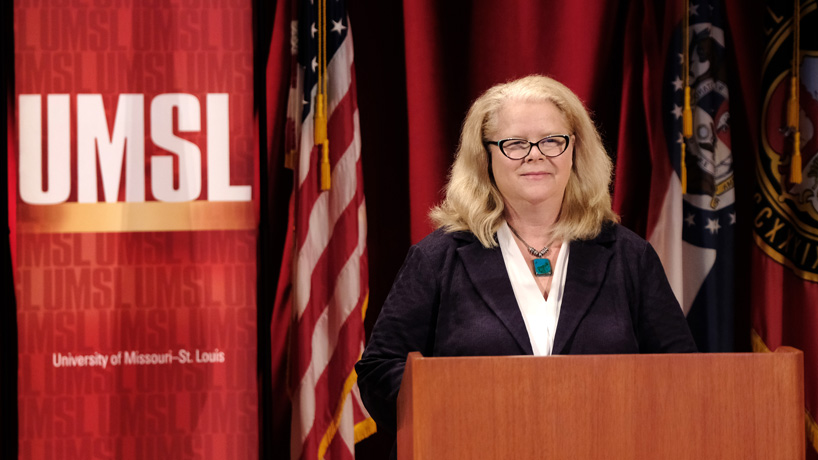
Chancellor Kristin Sobolik delivered the annual State of the University Address via livestream Thursday afternoon from the E. Desmond and Mary Ann Lee Theater. (Photo by August Jennewein)
Chancellor Kristin Sobolik sees the University of Missouri–St. Louis as an emerging institution, poised to begin making an even larger impact on the St. Louis region and beyond.
That was her message Thursday afternoon while delivering the annual State of the University Address via livestream from the E. Desmond and Mary Ann Lee Theater at the Blanche M. Touhill Performing Arts Center. There was no live audience for the event because of the coronavirus pandemic.
“We are growing our research, growing our philanthropy and dominating regional workforce development,” Sobolik said. “There’s a lot to be proud of, a lot to brag about and yet a lot of work to be done.”
UMSL’s research expenditures have increased by 57 percent over the past five years to $27.6 million in Fiscal Year 2020, and it has also seen growth in private donations which rose to more than $21 million in the past year. More than 31,000 donors contributed money to help UMSL carry out its mission.
Much of the research dollars have been spent on projects targeted at improving conditions in the St. Louis area. A new $1.3 million grant awarded to Jerome Morris, the E. Desmond Lee Endowed Professor of Urban Education, from the Spencer Foundation is just the most recent example. It will support Morris’ research, using community-based teams to study how past programs and reforms affected students in the Ferguson-Florissant, Jennings and St. Louis school districts.
More than $6.3 million from those private donations were specifically designated for scholarships. That includes a $4 million donation from George and Melissa Paz – the largest single philanthropic gift in UMSL’s history. Those scholarships help individuals pursue their educational dreams and achieve their goals while ultimately becoming investments in the future workforce in St. Louis.
Nearly 2,900 students received undergraduate, graduate or doctoral degrees from UMSL during the past academic year, bringing the total number of UMSL alumni to more than 30,000 in the past 10 years and more 105,000 since the university was established in 1963. Almost 75,000 of those graduates continue to live and work in the region and contribute to its economic prosperity.
As Sobolik noted, UMSL graduates are increasingly playing leading roles in the St. Louis business community. This summer, Ken Cella of Edward Jones was named the next chair of the St. Louis Regional Chamber’s Board of Directors. He will succeed Thompson Coburn’s Tom Minogue and Ameren’s Warner Baxter, becoming the third straight UMSL alumnus to hold that esteemed position.
The university is committed to continuing to educate a diverse group of students who are ready to join the St. Louis workforce and become leaders in their own right.
Last week, INSIGHT Into Diversity magazine named UMSL a recipient of a 2020 Higher Education Excellence in Diversity Award in recognition of its outstanding commitment to diversity and inclusion. It is the fourth time UMSL has received the award – the most of any institution in Missouri.
The university is continuing to promote inclusive excellence on campus. To that end, the university applied for and recently received a $1 million grant from the National Science Foundation ADVANCE program to improve gender equity, especially for women of color, in academic careers in the fields of science – including the social and behavioral sciences – technology, engineering and mathematics. Those faculty members will be crucial to teaching and mentoring future students.
Sobolik also announced that UMSL has received a $1.3 million TRIO Student Support Services grant from the U.S. Department of Education to enhance UMSL’s tutoring, mentoring, financial literacy and other services to better support first-generation students from under-resourced backgrounds.
The COVID-19 pandemic has brought significant challenges over the past six months. The university has had to take steps to adapt to cuts in state funding and adjust the ways it educates its students, with more than 60 percent of classes being held virtually this semester.
“I am proud of the ways in which our faculty and staff approached our reaction to the closure caused by the pandemic,” Sobolik said, “and in supporting measures to lessen the impact on students.”
Sobolik lauded the work of UMSL’s Unified Command team – Provost and Executive Vice Chancellor Marie Mora, Associate Vice Provost D’Andre Braddix, Chief of Police Dan Freet, Human Resources Executive Director Jim Hertel, Facilities Executive Director Daryl Ives, Assistant Vice Chancellor Justin Roberts, Chief of Staff Bob Samples and Campus Health Officer Chris Sullivan – for leading the university’s response to the pandemic last spring and planning for the safe reopening of campus.
Other highlights from Sobolik’s presentation:
- Later this fall, UMSL will break ground on Phase 1 of the Nursing Simulation Lab and Learning Center, a longtime priority of the campus that is badly needed as the number of clinical sites available has been constricted during this pandemic.
- The university continues to consolidate its footprint. The School of Social Work has relocated from South Campus to renovated space in the Social Science and Business Building. The Missouri Institute of Mental Health is also moving onto North Campus and will be housed in Benton Hall and the Regional Center for Education and Work.
- Meanwhile, over the past several months, UMSL has moved to divest itself of properties that are not central to its core operations, including MIMH’s former location in Innovative Technology Enterprises west of campus, Normandie Golf Course and Normandie Hall, the former Incarnate Word Convent property.
- UMSL is launching the National Security Community Policy Collaborative, which will implement programming and research for UMSL to engage in the growing geospatial ecosystem in St. Louis with the construction of the new National Geospatial-Intelligence Agency in north St. Louis.
Sobolik’s presentation slide deck can be viewed here, and video of the presentation can be found here.














